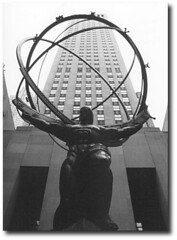Bias, debate and democracy
It is ironic that by turning off the comments on posts I am going against Ayn Rand’s quote I have on the side bar.
I still like debating ideas. I still think that challenging your beliefs is an important part of being informed.
However, I am starting to realize that blogs (in it’s current state at least) are not the greatest tool to accomplish this.
Take the discussions I have with Mr. Smart. They all follow the same pattern: From focused disagreement to a all over the place shootout. A lot of “I didn’t mean that” or “You are putting words in my mouth” kind of rhetoric.
I don’t blame him exclusively. It is difficult to keep track of a multi threaded discussion in this format. It doesn’t help that most of the times I am writing and doing 2 or 3 other things at the same time.
Maybe this dynamic only works for government employees or college professors (ok, that was a cheap shot).
--- x ---
Still talking about debating different point of views, my favorite blog has a nice post about bias (it is also worth to read the Jane Galt link).
I think there is a thin line between following your beliefs and being blindly biased (what Tyler calls procedural bias). Most of the issues are based on facts but have a heavy analytical component. Making value judgments is not black and white.
I think the easiest way to find bias is to look for exaggerations. Any time someone says something really extreme (Bush is a Nazi, Guantanamo is a vacation club) you know that you are not dealing with a person who takes the opponent arguments seriously.
--- x ---
One of the reasons I still believe in people being stronger than their biases is the success of democracy. I mean, you could never have a country like the US, which alternates between conservative and liberal in short and constant periods of time if people were really that closed minded.
The fringes get more attention because they are entertaining. But that’s only because they represent a vision not shared by the majority.
